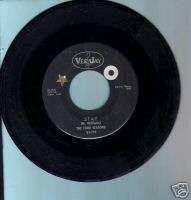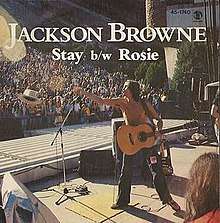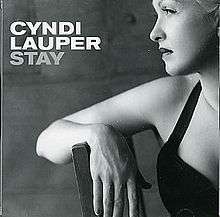Stay (Maurice Williams song)
| "Stay" | |
|---|---|
| Single by Maurice Williams and the Zodiacs | |
| B-side | "Do You Believe" |
| Released | August 1960 |
| Recorded | 1960 |
| Genre | Doo-wop |
| Length | 1:36 |
| Label | Herald |
| Songwriter(s) | Maurice Williams |
| Producer(s) | Phil Gernhard |
| "Stay" | ||||
|---|---|---|---|---|
 | ||||
| Single by The Four Seasons | ||||
| B-side | "Goodnight My Love" (from the album Big Girls Don't Cry and 12 Others) (second release) | |||
| Released | December 1963 | |||
| Recorded | 1963 | |||
| Genre | Rock, doo-wop | |||
| Length | 1:52 | |||
| Label | Vee-Jay | |||
| Songwriter(s) | Maurice Williams | |||
| Producer(s) | Bob Crewe | |||
| The Four Seasons singles chronology | ||||
| ||||
| "Stay" | ||||
|---|---|---|---|---|
 | ||||
| Single by Jackson Browne | ||||
| from the album Running on Empty | ||||
| B-side | "Rosie" | |||
| Released | 1978 | |||
| Recorded | Merriweather Post Pavilion, Columbia, Maryland, 1977 | |||
| Length | 3:28 | |||
| Label | Asylum | |||
| Songwriter(s) | Maurice Williams | |||
| Producer(s) | Jackson Browne | |||
| Jackson Browne singles chronology | ||||
| ||||
| "Stay" | ||||
|---|---|---|---|---|
 | ||||
| Single by Cyndi Lauper | ||||
| from the album At Last | ||||
| Released | 2004 | |||
| Genre | Pop | |||
| Length | 3:15 | |||
| Label | Sony | |||
| Songwriter(s) | Maurice Williams | |||
| Cyndi Lauper singles chronology | ||||
| ||||
"Stay" is a doo-wop song written by Maurice Williams and first recorded in 1960 by Williams with his group the Zodiacs.[1] Commercially successful versions were later also issued by The Hollies, The Four Seasons and Jackson Browne.
Writing and original recording
The song was written by Williams in 1953 when he was 15 years old. He had been trying to convince his date not to go home at 10 o'clock as she was supposed to. He lost the argument, but as he was to relate years later, "Like a flood, the words just came to me."
In 1960, the song was put on a demo by Williams and his band, the Zodiacs, but it attracted no interest until a ten-year-old heard it and impressed the band members with her positive reaction to the tune. The band's producers took it along with some other demos to New York City and played them for all the major record producers that they could access. Finally, Al Silver of Herald Records became interested, but insisted that the song be re-recorded as the demo's recording levels were too low. They also said that one line, "Let's have another smoke" would have to be removed in order for the song to be played on commercial radio. After the group recorded the tune again, it was released by Herald Records and was picked up by CKLW. It entered the U.S. Billboard Hot 100 on October 9, 1960 and reached the number one spot on November 21, 1960. It was dislodged a week later by Elvis Presley's "Are You Lonesome Tonight?". On the Herald recording, Williams sang lead and Henry Gaston sang the falsetto counter-verse.
The original recording of "Stay" remains the shortest single ever to reach the top of the American record charts, at 1 minute 36 seconds in length. By 1990, it had sold more than 8 million copies. It received a new lease of popularity after being featured on the Dirty Dancing soundtrack.
Other versions
- In August 1963, the song was released by the Hollies,[2] who took it to number eight in the UK Singles Chart.
- The Four Seasons version was first released on their June 1963 album The 4 Seasons Sing Ain't That a Shame and 11 Others; it was later released as a single in December 1963. Vee Jay originally released it as the B-side of "Peanuts" in December, but when disc jockeys started to "turn the single over" to play "Stay" on the air, the record company superseded the single with a new one with "Stay" as the A-side and "Goodnight My Love" as the new B-side.[3] It peaked at number 16 on the US Billboard Hot 100[4][5] in April.
- In 1964, the song was recorded by The Dave Clark Five on their studio album Glad All Over.
- The song was recorded in 1968 by Jan & Dean for release on their album Carnival of Sound but the album was not released until 2010.
- Singer-songwriter Andrew Gold recorded a version of "Stay" for his 1976 album What's Wrong with This Picture?.
- A version of the song with revised lyrics is the last track on Jackson Browne's 1977 album Running on Empty. The song, which follows on the heels of Browne's "The Load-Out" begs the audience to stay for an encore and includes an extensive playout. It includes backing contributions from David Lindley and Rosemary Butler. Browne, Butler and Lindley each contribute a similar verse in turn in ascending vocal ranges. It was released as a single and reached number 20 in the U.S. as well as number 12 in the UK.
- Bruce Springsteen & the E Street Band recorded a version for the No Nukes album in September 1979.
- "Stay" was the third and final single from Cyndi Lauper's 2003 album At Last. It was a promo-only single, released only in the U.S. and Australia. The video that accompanied it is rarely seen but is commercially available as a special feature on the DVD, Live at Last.
- In 1980, Austrian singer Georg Danzer wrote a German text to the Jackson Browne medley "The Load Out"/"Stay". It was performed live on the album Direkt as "Roadie Song".
- Lyrics from the song were interpolated on reggae artist Buju Banton's song "Hush Baby Hush" on his 1995 album 'Til Shiloh.
- The recording of the song by British pop group Dreamhouse was first released as a single in 1995, then again in 1998.
- Italo disco duo Marx & Spencer released their version in 1983.
- Australian group Human Nature included the song on their 2014 album Jukebox.
See also
References
- ↑ "Maurice Williams & The Zodiacs - Stay / Do You Believe at Discogs". Discogs.com. Retrieved 2016-09-26.
- ↑ "Archived copy". Archived from the original on 2011-07-27. Retrieved 2010-04-11.
- ↑ Tom Neely, Goldmine Price Guide to 45 RPM Records, 5th edition (KP Books, 2005) ISBN 0-87349-840-2
- ↑ "Billboard Hot 100 - April 4, 1964". Retrieved September 12, 2017.
- ↑ Whitburn, Joel (2004). The Billboard Book of Top 40 Hits: Eighth Edition. Record Research. p. 238.